big read Big Read
More than a disability, dementia takes a toll on the whole family – and more young patients are getting it
Caregivers of people living with dementia say the condition changes more than just memory – it alters lives, relationships and even personalities. As more are diagnosed in their prime, experts say individuals should be on guard for symptoms and risk factors.

As Singapore’s population ages, more families may have to provide caregiving to loved ones with dementia, given that the number of people living with dementia is projected to rise. (Illustration: CNA/Nurjannah Suhaimi)

This audio is generated by an AI tool.
While many of his peers were focused on graduation trips or job prospects, Mr Eric Lim, then a final-year undergraduate in 2013, was preoccupied with caring for his late father. His father had suffered a series of strokes and was later diagnosed with vascular dementia.
"It was very stressful, because I felt it was like a role reversal: All the time it's always my parents taking care of me, but then suddenly I'm thrust into this role," said Mr Lim, now 36 and co-founder of Somnus Sleep Wellness, a company that helps people with sleep issues such as insomnia.
Those unfamiliar with the condition might associate dementia mainly with memory loss, but as Mr Lim and other caregivers who spoke to CNA TODAY shared, its impact extends far beyond that.
Many other medical conditions and disabilities require caregivers to help their loved ones perform daily tasks. But not many, unlike dementia, changes the personality of the patients, or the loved ones caring for them.
For example, Mr Lim's father, who was diagnosed at 67, became easily agitated and would constantly pluck at his diaper in distress after losing control of his bowel movements. Such behaviour often left Mr Lim frustrated.
"Before he fell ill, my dad was always a very gentle person. So when his personality changed, we went: 'What's happening?'. It got us very stressed, and I experienced burnout," said the entrepreneur.
"I found myself more impatient, and it was a lot harder to respond with empathy for my dad, even though I'm usually not that kind of person."
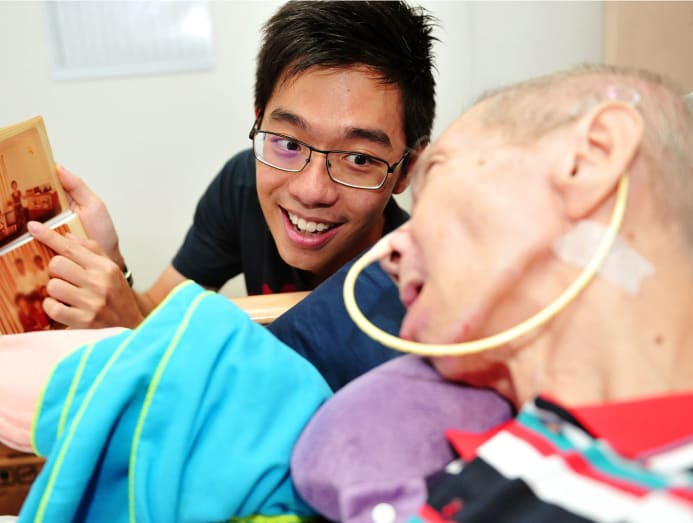
As Singapore’s population ages, more families may go through what Mr Lim experienced, given that the number of people living with dementia is projected to rise.
The prevalence of dementia among older adults aged 60 and above decreased slightly over the past decade, to one in 11 in 2023 from one in 10 in 2013. But the overall number of such adults with the condition rose to 73,918 from 51,934 over the same period, according to a study by the Institute of Mental Health (IMH).
The total number is projected to increase to about 152,000 by 2030, according to the Ministry of Health.
Notably, some other figures also point to a growing number of young-onset dementia, which is when the condition strikes those under the age of 65.
In a study released in 2016, the National Neuroscience Institute (NNI) saw more than a threefold increase in the number of patients with young-onset dementia over the five preceding years, though it did not provide actual numbers.
More recently, the number of new cases it saw at Tan Tock Seng Hospital (TTSH) went up from 60 in 2013 to 90 in 2023. The number dropped slightly to 80 last year, the institute told CNA TODAY.
Global figures also point to a growing number of young-onset dementia, said Dr Kelvin Tan, head of the Minor in Applied Ageing Studies programme at the Singapore University of Social Sciences.
One study by a group of researchers from Sichuan University, China and published in February found the global incidence of dementia among people under 65 years of age rose slightly from 16.24 per 100,000 people in 1990 to 17.16 per 100,000 people in 2021, he added.
Experts such as Associate Professor Adeline Ng, the lead for the dementia clinical programme at NNI, identified two reasons as to why young-onset dementia appears to be more common now.
There is now greater public awareness about the condition, leading to more diagnoses, she noted. Another reason is the rise in risk factors for certain types of dementia such as vascular dementia, which arises from reduced supply of blood to the brain due to damaged or blocked blood vessels.
"These risk factors include high blood pressure and diabetes – if they are not controlled when the person is diagnosed in middle age, then it can significantly increase the risk of young-onset dementia," said Assoc Prof Ng, who is also a senior consultant in neurology at the institute.
WHAT YOUNG-ONSET DEMENTIA LOOKS LIKE
Sometime in 2016, Ms Betty Pay, then a 59-year-old cashier at a town council office, began making mistakes in her work that were uncharacteristic of her.
Her husband, Mr Lim Kay Kwong, recounted that there were days when she had to repay the town council about S$200 due to her errors in processing payment.
"At that period of time, she could still say, 'Every day, I'm counting wrongly,' and was very nervous about it," Mr Lim told CNA TODAY in Mandarin recently.
The family, including their two adult children, decided that it was better for Ms Pay to stop working rather than having to reimburse the losses caused by her mistakes constantly.
After she resigned, Ms Pay's cognitive functions continued to worsen, especially after her father died that same year. Her condition deteriorated to the extent that she needed help to perform basic daily tasks such as showering and eating.
Mr Lim, 73, said he felt deep sorrow watching his once vivacious and sociable wife become a mere shadow of her former self.
Mr Lim quit his job as a public bus captain and became a caregiver for his wife, who was later formally diagnosed with dementia.

Young-onset dementia cases, such as Ms Pay’s, can differ somewhat from those in much older adults in terms of causes and symptoms, said experts.
The neurodegenerative Alzheimer's disease and vascular dementia are the most common causes of later-onset dementia.
While these can also lead to young-onset dementia, genetics play a more significant role in younger individuals, said Dr Vanessa Lacuesta, senior manager for medical affairs at DKSH Healthcare Singapore.
"Beyond genetics, certain medical conditions are more commonly associated with young-onset dementia. These include conditions like traumatic brain injury, substance abuse – particularly heavy alcohol use – and even some autoimmune or infectious diseases," she added.
Mr Bernard Lim, director of advocacy and communications at Dementia Singapore, said: "While memory loss is one of the most common symptoms of dementia, particularly with Alzheimer's disease, people diagnosed with young-onset dementia are more likely to experience symptoms related to executive function, language or behavioural changes."
Dementia Singapore is a social service agency specialising in dementia care, support and advocacy.
Experts said that the cognitive decline may also happen more rapidly among younger cases.
Cases such as Ms Pay’s show how early-onset dementia presents an additional set of challenges to the patient and their family, compared with dementia developed later in life.
For instance, those with young-onset dementia are often still gainfully employed or even at the peak of their careers.
"This leads to substantial economic strain due to loss of employment and income, unlike many older patients who may already be retired," said Mr Lim from Dementia Singapore.
The 2016 NNI study found that the economic burden of young-onset dementia patients was almost twice that of older dementia patients.
The difference was mainly due to indirect costs arising from loss of income, with about 43.2 per cent of young patients with dementia reporting a loss of employment due to their condition, compared with 2.4 per cent of elderly patients.
The institute told CNA TODAY that it is embarking on a new follow-up study to look into the economic impact of young-onset dementia and dementia in general.
The World Health Organization said that dementia cost economies around the world US$1.3 trillion in 2019. About half of these costs are attributable to care provided by informal carers such as family members, who provide on average five hours of care and supervision daily.
In Singapore, a 2024 survey found that the average monthly cost of care for people living with dementia is close to S$2,500. It can go up to S$3,000 if the person is unable to perform three or more activities of daily living, according to the survey of about 1,000 Singapore residents by insurance provider Singlife.
Ms Helen Shen, group head of products at Singlife, said that young-onset dementia may also lead to premature depletion of savings or retirement funds, which the individual may not have had the time to build.
"Additionally, because dementia is often associated with older age, younger individuals may lack adequate insurance coverage or financial plans to address the condition," she said.
Dr Wayne Freeman Chong, a geropsychologist, or psychologist specialising in the mental health of older adults, said the caregiving distribution within a family also differs.
He noted that for elderly dementia patients, their caregivers tend to be their adult children. For younger people with dementia, however, the caregiving duty often falls upon their spouses instead, because the children may still be young.
"The person with young-onset dementia may gradually lose the ability to care for his or her own children. So then the caregiver is left to care for the spouse and their children on their own," said Dr Chong, who runs GeroPsych Consultants and is an adjunct lecturer at Nanyang Technological University (NTU).
On a personal level, the psychosocial impact on younger patients is also magnified, as they have to grapple with the diagnosis while their peers are healthy, said Mr Bernard Lim of Dementia Singapore.
Ms Usha Devi Ratnam, who leads the dementia programme at SASCO Senior Citizens' Home, added that because of this, and the fact that the condition is commonly associated with the elderly, some younger individuals “might be in the denial stage” in the initial phase of young-onset dementia, thus impeding early detection.
"So they might not be able to see that they have dementia. They are not going out to seek help," said Ms Usha.
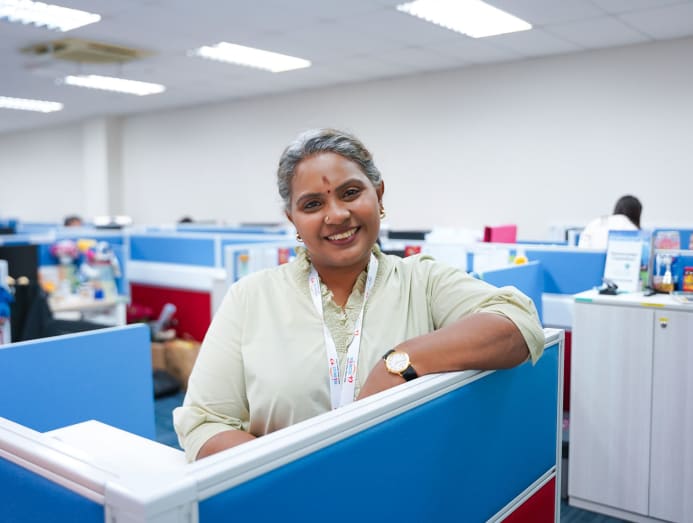
HOW TO BETTER SUPPORT WORKERS WITH DEMENTIA
Singapore has made big strides in providing support for people with dementia and their loved ones, noted the experts and caregivers, though they said there is always room for improvement.
While many older people with dementia now still have family members who can make caregiving decisions for them, this is quickly changing with more unmarried and childless people around, said Assistant Professor Shannon Ang from the Nanyang Technological University (NTU).
This gives rise to questions like what happens when there is no obvious candidate to care for such people with young-onset dementia, and whether the professional deputies and donees scheme, for instance, should be expanded, the sociologist added.
For instance, Dr Wayne Freeman Chong, a psychologist specialising in the mental health of older adults, urged for certain cognitive stimulation programmes to be expanded to include more among those who are at risk of dementia, and not just focus on those who already have the condition.
More subsidies could also be provided to reduce the financial burden of caregiving and to make cognitive stimulation programmes more affordable.
To better support those with young-onset dementia, experts said that personalisation and job matching can balance employers’ productivity goals with the need to provide work that can improve the cognitive state and overall well-being of the employee.
Ms Patricia Lee, who runs a company that offers therapy activities for people with dementia, gave examples of her programme participants who, despite their condition, are given the opportunity to perform meaningful jobs instead of menial tasks.
They include a former principal who is thriving as a private tutor and a former beauty salon business owner who has recently begun work as a beautician.
Her husband Arthur Wong, who himself is diagnosed with mild cognitive impairment, said: "It's important to (provide them a job with) dignity, show them they are useful members of society."
However, in a knowledge-based economy like Singapore, young-onset dementia is more difficult to accommodate in the workplace as compared to other ailments that afflict the body physically instead of the brain, said Asst Prof Ang.
"There is no impetus for businesses to redesign jobs to accommodate those with young-onset dementia unless it affects their bottom line," said the sociologist.
This raises the question whether the state would be willing to step in "when things no longer align with our values" or choose to leave it to market logic.
"What is needed for all of us is a society that values individuals beyond their economic productivity; where we all have an obligation to each other’s wellbeing, not just a single-minded belief in our own merit,” he said.
CAREGIVERS ARE ALWAYS "ON THE EDGE"
Although dementia in the elderly is a condition that society may be familiar with, the immense toll it takes on both patients and their loved ones is often underestimated.
Singlife's 2024 survey found that 33 per cent of respondents did not see the link between dementia and disability.
But in fact, nearly 90 per cent of people with dementia need help with one activity of daily living and live with a disability, according to the survey.
The latest Well-being of the Singapore Elderly study by the Institute of Mental Health (IMH) found that caregivers of individuals with dementia had significantly higher care burden and level of psychological distress than caregivers of people without dementia.
Mr Eric Lim the entrepreneur recalled how being his father’s main caregiver was physically taxing and affected his work and social life.
Though he had hired a helper to care for his father during the day, Mr Lim himself would settle the old man's needs, such as bathing and feeding him, before he left for work. These were also the first things Mr Lim did when he returned home.
"I will be thinking, 'If I go out to meet my friends, what's going to happen to my dad at home?'" said Mr Lim, who added that he found his thoughts drifting to his father even at work sometimes.
Marketing professional Imran Johri, 51, and his family endured a different kind of emotional toll after his mother was diagnosed with dementia following the removal of a brain tumor in 1997.
His family had initially thought that the cognitive lapses they saw in their mother, now 74, were part and parcel of the recovery process post-surgery.
Coming to terms with the fact that their mother had a degenerative condition and would never return to her old self was tough on all of them.
"Knowing dementia is one thing. But to accept that one of your family members has it, is another thing altogether," Mr Imran said.
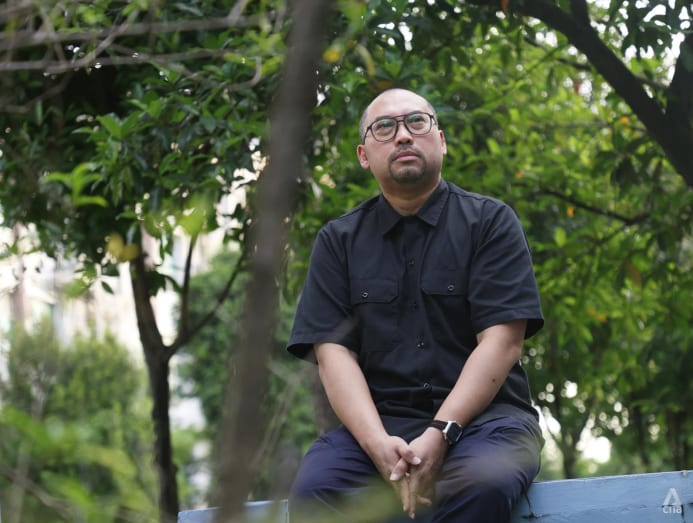
During the fasting month in March this year, his mother had a fall that exacerbated her cognitive decline – she could no longer recognise him, which further added to his sorrow.
Mr Imran also had to deal with the anxiety of being "always on standby", although he does not live in the same household as his mum.
"We're on the edge all the time. Whenever I get a call and I see my dad's number or the helper's number, especially late at night or early morning, both of us (me and my wife) will jump."
Tapping external help, such as a hired helper or daycare service, can ease the physical burden but does little to relieve caregivers of the emotional turmoil of caring for a loved one with dementia.
Ms Kate Cham, the co-founder of live-in helper and caregiver agency Anglo Caregivers, and her mother were her grandfather’s caregivers during the last two years of his life.
They mainly looked after the elderly man on weekends when their hired helper took her day off.
On those days, Ms Cham, 35, and her mother experienced first-hand the physical effort required to bathe a completely immobile bedridden person and tube-feed him. Her late grandfather, who died at the age of 91 in 2022, also had Parkinson's disease on top of dementia.
One challenge they faced was making difficult choices on his behalf in relation to his medical and caregiving needs.
During the late stages of his illness, he indicated to Ms Cham's mother that he did not want to prolong his suffering, though he never actually discussed it properly with the rest of his children.
Family members could not agree on the best way forward partly because some of them harboured hopes that he would recover one day.
For example, tensions arose after he lost his ability to eat and needed to be tube-fed.
"Within the family, they couldn't agree upon whether to take out the tube or to continue feeding him, because among the siblings, they have different opinions on what's best for my grandfather. In the end, we continued with the tube and continued to take care of him," she said.
The fact that there was no formal discussion on the matter before he lost his cognitive ability made it harder.
"Sometimes we would see his suffering and remember how he had previously expressed his desire to die peacefully, and it made us wonder whether we were prolonging his suffering by extending his care through external means. There was a lot of struggle for us," she said.
"So when he finally passed on because of a COVID-19 related infection, for me, I felt like it was a relief for him, as well as for us, knowing he was in a more comfortable place,” said Ms Cham.
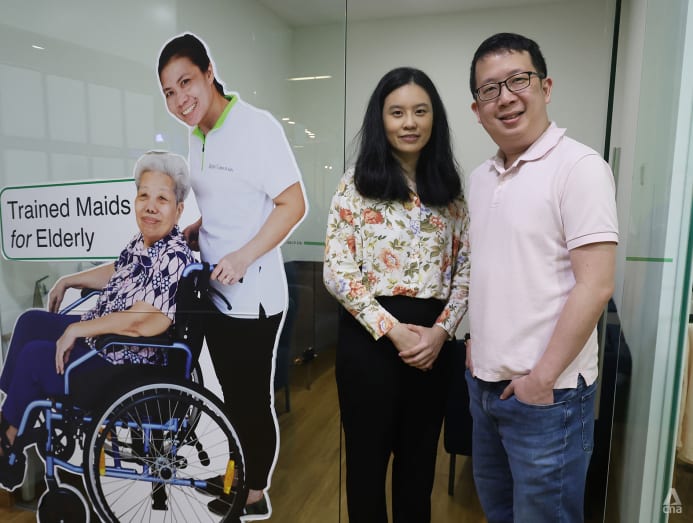
Even when the loved one still retains a relatively high level of cognitive ability, family members still face significant mental and emotional challenges.
Mr Arthur Wong, 64, was diagnosed with mild cognitive impairment in 2020. It is a condition where an individual experiences a greater decline in cognitive abilities compared with their peers of the same age.
Mild cognitive impairment may, though not always necessarily, lead to dementia.
Mr Wong and his wife, Ms Patricia Lee, 61, run a company that offers therapy activities for people with dementia.
One of these activities includes reminiscence therapy at NNI, as part of the National Neuroscience Institute Integrated Cognitive Engagement (NNICE) - OWOW! Programme for patients with mild dementia.
Mr Wong, a former engineer, said that his condition mainly affects his problem-solving and memorising ability to a certain degree. As such, he relies on his wife to remember his PINs and passwords, and to occasionally steer him back to the workshop they are conducting when he unwittingly meanders from their planned activities.
Asked how she felt when her husband was diagnosed with the condition, Ms Lee simply said: "I grieved".
"I am still grieving, but it's getting better," she added.
She said that at times, she and her son still treat Mr Wong as if he still has his full intellectual capacity and forget that he may be facing cognitive challenges, making eye gestures at each other whenever Mr Wong makes gaffes.
"But we learn to laugh. And Arthur learns to laugh with us – and that's one way we learn to embrace his impairment,” Ms Lee said.
TAKING CONTROL OF RISK FACTORS
Even as the number of people with dementia is expected to grow in Singapore, there are many things that individuals and their families can do to mitigate its impact, experts said.
"Taking early preparation and preventive action on dementia and introducing innovative intervention and care will cushion the impact of dementia," said Dr Tan of SUSS.
Early detection is important, experts noted.
"Enhancing public awareness and early diagnostic capabilities for young-onset dementia is crucial, as timely intervention can significantly impact the disease's progression and allow families to plan ahead,” said Mr Reuben Ong, vice-president of DKSH Healthcare.
"This would also need to be followed up with awareness on treatment options to better enable patients to live as independently and meaningfully as possible within the community."
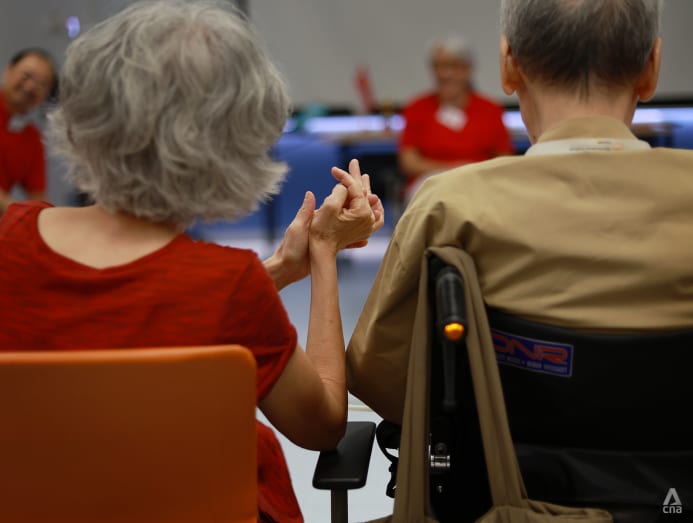
Dr Chong the geropsychologist highlighted that although there are genetic factors when it comes to dementia, a Lancet Commission report in 2024 suggested that up to 45 per cent of risk factors are preventable by making lifestyle changes.
These would include reducing a sedentary lifestyle, eating healthily and paying attention to one's cardiovascular health.
In this regard, Assoc Prof Ng of NNI added that the Healthier SG initiative is helpful in the fight against both early- and late-onset dementia because of its focus on preventing and controlling risk factors such as high blood pressure, high cholesterol and diabetes.
For those who have been diagnosed with the condition, certain stimulating cognitive exercises, such as those organised by the dementia daycare programmes at SASCO or at the Methodist Welfare Services (MWS) Senior Care Centre, can help slow down the progression of the condition.
An added benefit of attending such programmes is that they give respite for the caregiver at home.
Ms Pay, for instance, has been attending the daycare programme at MWS Senior Care Centre in Eunos, which allows her husband to do household chores and have some me-time.
"If it is only me taking care of her 24/7, it would be very stressful," Mr Lim Kay Kwong said.
SASCO, MWS and Anglo Caregivers all told CNA TODAY that they have seen an increase in demand for their services from clients with dementia and their families.
Since MWS' day care centre opened in 2022, the number of clients with dementia has increased from 45 to 73 to date, while Anglo Caregivers saw a 31 per cent increase in enquiries for caregivers for dementia patients from the second half of last year to the first half of this year.
The experts also highlighted reminiscence therapy, which involves discussion about memories and past experiences through the use of prompts such as artefacts, photographs, music and familiar smells to aid in memory retrieval.
Studies have shown that reminiscence therapy can significantly reduce behavioural and psychological symptoms of dementia and improve cognitive function, mood and quality of life, while lowering depression and neuropsychiatric symptoms.
Caregivers also noted the importance of preparing one's Lasting Power of Attorney and Advance Care Planning (ACP) while one is still healthy. This is to spare family members the mental and emotional ordeal of making difficult decisions on their behalf should their cognitive capacity decrease in the future.
The Ministry of Health – which launched an online ACP planning tool in July – said that 77,000 advance care plans were completed in Singapore as of Jul 11 this year.
Reflecting on his journey, Mr Eric Lim said that the most challenging of caregiving for someone with dementia was the emotional aspect of it.
"Even though your loved one is physically there, it's like they are fading away, daily, gradually. And I think that's the hardest part to reconcile," said Mr Lim.
Which is why he said, even as caregivers take care of their loved ones living with dementia, it is just as important to find support for themselves instead of overextending themselves, as "it doesn't help in the long term".
"Know when to rest, know when to let go, when to let other family members step up as well, and not to shoulder the weight of responsibilities alone."
Additional reporting by Nikki Yeo.

















